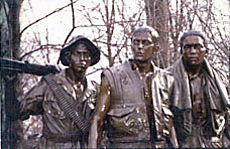This article was first published in S&P's "Spiritual Literacy in Wartime" series during the American invasion of Iraq. Unfortunately, empathy practice for those fighting in and suffering from war continues to be needed as conflicts are raging throughout the world.
People are already tired of the war coverage, we hear. Nobody wants to watch a war movie when a real war is going on. And besides, so many people are conflicted about what's happening in Iraq. At the peace marches, they chant, "We're not against the soldiers; we're against the war." Signs proclaim: "Support our troops. Bring them home."
Parts of us simply don't want to think about what the soldiers are going through in harm's way. We cringe at the casualty figures. We ache for the young soldier who, upon learning that his unit had killed women and children, declared, "This is the worst day of my life." And it's just beginning.
Empathy involves being aware of and sensitive to the feelings and situation of another person so that you have an experience of life as that person would know it. A few weeks ago, we recommended doing empathy practices with the children of Iraq. Now it's time to take our practice to the battlefield and empathize with the soldiers.
 Readings
Readings
- Pema Chodron on Meeting the Enemy and the Friend Within
Buddhist teacher Pema Chodron reminds us that spiritual work requires that we turn toward, not away, from situations and feelings that disturb us. When we look deeply at war, we find that parts of us are already on the battlefield. We have met the enemy and they are us. But we have also met the friend and they are us. This is a good perspective to remember when contemplating images of war.
- Louise Diamond on Facing Violence by Watching War Movies
The author, who heads an institute that deals with ethnic conflicts around the world, has spent many years in war zones, facing the same fears and situations that combatants must deal with. When she chose this work, she decided that she needed to prepare herself, and that meant dealing with her own strong aversion to any kind of violence. She spent a year going to every war movie she could find. This passage is a blueprint for practicing empathy with those on the front lines.
 Practices
Practices
Veterans tell us that nobody can know what it’s like to be in a war without actually being there. But war movies still try to approximate the experience. The following films, all available on video or DVD, help us see war from the point of the view of those in the midst of it — soldiers, civilians, journalists, and others.
- Before the Rain
This stark and sober film, nominated for an Oscar in 1995, depicts the long arms of war. Set in the former Yugoslavia and in London, it is a grueling portrait of ethnic hatred told through the stories of Macedonian Christians and Albanian Muslims.
- Born on the Fourth of July
This gripping film, based on Ron Kovic's 1976 autobiography portrays the transformation of an Vietnam soldier whose idealism and traditional patriotism are ambushed by his experiences on the battlefield and reborn in political protest.
- Empire of the Sun
This film, directed by Steven Spielberg, is set in a Japanese prison camp during World War II. It vividly conveys the brutality, betrayal, and arbitrary violence of war and the manifold ways it dehumanizes people.
- Full Metal Jacket
A drill sergeant tells the soldiers that thinking is a vice and killing is a virtue. So begins this indictment of the Vietnam War. Director Stanley Kubrick uses a buck-shot style that conveys how the lunatic violence and disorder of battle scars the soldiers’ souls.
- Gallipoli
One of the most powerful war films of all time, which manages to make its points with very few scenes of actual combat, it gives us war from the perspective of the little people. Two young Australian recruits go to war seeking adventure and end up in the trenches of Gallipoli facing certain death.
- A Midnight Clear
This World War II drama reveals war to be a dirty trickster. A five-man intelligence unit at an observation post in the forest nearly buckles under the uncertainties of battle. Some powerful religious imagery conveys the soldiers’ dependency on each other.
- No Man's Land
Winner of the Academy Award as Best Foreign Language film in 2001, this astonishing movie is set in Bosnia in 1993. The story revolves around a Bosnian soldier, lost behind enemy lines, who finds he is lying on top of a landmine; if he gets up it will detonate.
- Saving Private Ryan
This vivid World War II drama opens with a 20-minute sequence showing the Allied invasion on D-Day, exposing the hellishness of war as no other film has ever done. Violence is not redemptive, and there is no grandeur in dying for one’s country. All that matters in the destructive rapidity of battle are the soldiers’ small acts of decency and kindness.
- The Thin Red Line
Set in the World War II battle zone of Guadalcanal, this eerie drama depicts soldiers seized by dreams, visions, and hallucinations in the midst of their combat duties. War draws a strange mixture of virtue and vice out of men.
- Three Kings
Set right after the Gulf War, this ragtag satire spits in the face of war and salutes creative compassion in a nightmarish situation.
- Welcome to Sarajevo
In this besieged city in 1992, Serbian sharp-shooters are shooting civilians day after day. A journalist desperately tries to make a difference in the life of a shell-shocked, terrified, and lonely little girl.
